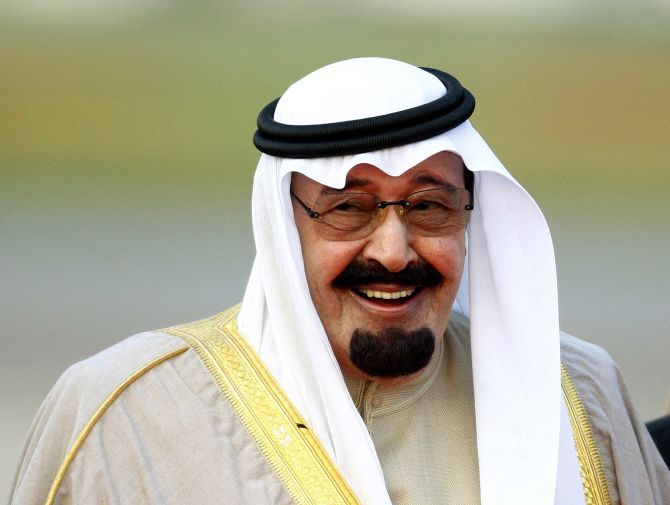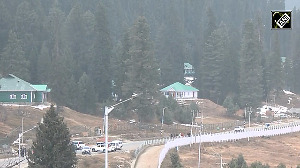Saudi Arabia's Saudi King Abdullah bin Abdulaziz died on Friday and his half-brother Salman took over reigns of the world's top oil exporting nation in a smooth transition of power, calling for "unity and solidarity" among Muslims.

The 90-year-old king, who had ruled Saudi Arabia -- the birthplace of Islam - since 2005, had been suffering from a lung infection and was admitted to hospital last month.
"His Highness Prince Salman Bin Abdulaziz Al Saud and all members of the family and the nation mourn the Custodian of the Two Holy Mosques King Abdullah Bin Abdulaziz, who passed away at exactly 1 am (local time) this morning," said the statement. However, the reason for his death was not known.
Foreign leaders, including Turkish President Recep Tayyip Erdogan and Pakistani Prime Minister Nawaz Sharif, took part in the funeral for the monarch at the Imam Turki bin Abdullah mosque in Riyadh.
Abdullah's covered body was carried by members of the royal family wearing traditional red-and-white checked 'shemagh' headgear, following mid-afternoon Asr prayers.
Kuwait's Emir Sheikh Sabah al-Ahmad al-Sabah, Bahrain's King Hamad bin Isa al-Khalifa and the Emir of Qatar Sheikh Tamim Bin Hamad al-Thani joined other leaders at the funeral.
The elderly ruler had sought to modernise the ultra-conservative Muslim kingdom and led it through a turbulent decade in a region shaken by the Arab Spring uprisings and Islamic extremism.
Abdullah became king of the oil-rich nation, a key US ally in the Middle East, in August 2005 but had been running Saudi Arabia since 1996, after his half-brother King Fahd's stroke.
To ensure a smooth transition, the kingdom quickly appointed his 79-year-old half-brother, Salman bin Abdulaziz, to the throne. His brother Prince Muqrin, a decade younger, is the new crown prince.
In his first public statement as the new ruler, Salman vowed to maintain a steady course for the kingdom.
"We will, with God's will and power, adhere to the straight path this country followed since its establishment by King Abdulaziz and his sons after him, and will not deviate at all from it, since our constitution is the book of Allah (Quran) and the teachings of Prophet Mohammed," he said in televised statement.
He also spoke of the "desperate need for unity and solidarity" among Muslims, saying Saudi Arabia would continue to promote that.
"We will remain with God's strength attached to the straight path that this state has walked since its establishment," the new king said and asked for God's support him in his "great responsibility".
In an indirect reference to the current situation in the greater Middle East where the extremist Islamic State group is wielding increasing influence, he said: "The Arab and the Islamic nations are in dire need of solidarity and cohesion."
Salman has been crown prince and defence minister since 2012. Before that, he was governor of Riyadh province for five decades.
The new king moved swiftly to name the country's interior minister Prince Mohammed bin Nayef as deputy crown prince, making him the second-in-line to the throne.
He also appointed his son Prince Mohammed -- in his 30s and was head of his father's royal court -- as defence minister.
Abdullah, who overcame a stutter, was educated in religion, Arab literature and science by Islamic scholars at the royal court. From the Bedouin nomads, he learned traditional ways, including horsemanship and desert warfare. In 1962, he was appointed commander of the national guard, which draws recruits from the Bedouin tribes, protects the king and acts as a counterweight to the army.
Four of Abdullah's half brothers preceded him to the throne.
King Khalid appointed Abdullah as second deputy prime minister in 1975. In 1982, Fahd, Khalid's successor, named him deputy prime minister and crown prince.
After Fahd's stroke, Abdullah ran the government at first as regent. Political pressures later forced the removal of the regent title, but Abdullah remained the effective decision-maker until assuming the throne in 2005.
He refused to sign any official papers with his own name as long as his stricken brother lived. Fahd died on August 1, 2005.
King Abdullah spoke as plainly as the Bedouin tribesmen with whom he had been sent to live in his youth. He refused to be called 'Your Majesty' and discouraged commoners from kissing his hand.
He shocked the 7,000 or so Saudi princes and princesses by cutting their allowances. He was described as ascetic, or as ascetic as someone in the habit of renting out entire hotels could be.
King Abdullah's reign was a constant effort to balance desert traditions with the demands of the modern world, making him appear at times to be shifting from one to the other.
In line with Islamic law, King Abdullah kept no more than four wives at once, and was married at least 13 times. He fathered at least seven sons, nearly all of whom have occupied powerful positions as provincial governors and officers in the national guard.
Of his 15 known daughters, one is a prominent physician, and another has appeared on television to advocate for women's rights.
Condoling the king's death, Prime Minister Narendra Modi said, 'In King Abdullah, we have lost an important voice who left a lasting impact on his country. I condole his demise. Our thoughts are with the people of Saudi Arabia, who have lost a guiding force in King Abdullah, during this hour of grief'
'A few days ago I spoke to Crown Prince Salman and enquired about King Abdullah's health. News of King Abdullah's passing away is saddening,' Modi added on Twitter.
The country produces 9.5 million barrels a day and exports 7 million. It accounts for over a 10th of global supply and a fifth of crude sold internationally.
US President Barack Obama, who visited the ailing king in his desert compound last March, was quick to condole the death of King Abdullah, calling him a "valued" ally and a "candid" leader who took bold steps in advancing the Arab Peace initiative.
UK Prime Minister David Cameron said he was "deeply saddened" by Abdullah's demise. He said the king would be remembered for his "commitment to peace and for strengthening understanding between faiths".
Paying tribute to the late monarch, UN Secretary General Ban Ki-moon said he has left a "tangible legacy" that can still show the path towards peace in the Middle East.










